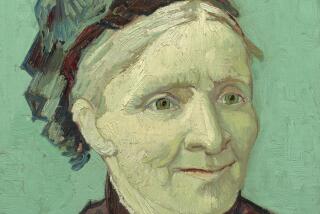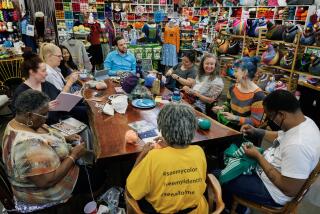To the Chicks . . . She’s a Good Egg : Delia Giuffre Tends Her Brood at Museum Incubator
- Share via
And then I fell in love, all at once, with these puffy little things. --Delia Giuffre
All the technology of the ‘80s doesn’t help, not in the beginning.
The chick comes into the world alone, unaided, on one chick-power’s worth of determination.
First they make a tiny pinhole in the egg. Completely pooped by the effort, they nap. An hour, two, three.
Then back to the task, widening the hole. Instinctively, they sense the moment de verite . They brace their feet against the bottom and shove up with the head, into a Brave New World.
Delia Giuffre is there to greet them.
If they’re lucky.
The unlucky ones are born at night. First glimpse of the world is a moonscape of metal grid, under the clear plastic bubble of the incubator at the Museum of Science and Industry.
Delia Giuffre--pert, brunette, 40-ish--was born in Peru of Italian and Spanish parents. She has been a painter, sculptor, prize-winning jewelry designer. She has “climbed mountains” and descended into valleys, and it was during one valley last year that she answered a help-wanted ad placed by the Museum of Science and Industry.
“When they offered me this job (monitoring the basement floor and tending the incubator) I said to myself, ‘Chickens? I’m a designer, what am I going to do with chickens ?!
“I didn’t know anything about them-- anything . When I was a tiny girl, my grandmother had them, but I never touched them.
“So I tell myself, ‘I don’t think I’m going to like this job. I’m going to try it for a week and then very politely I’m going to tell them that I’m not cut out for this job.’
“And then I fell in love, all at once, with these puffy little things. They are so loving ! They’re not little stiff things that jump, they are tender. They return your love. They answer you when you talk to them. They are adorable .
“I was as surprised as anyone else when I ended up liking the job. But these poor things have no mother!
“They’re the only ones in the world--unless I am mistaken--that don’t see their mother when they are born. Even birds, the mother comes and feeds them until they’re ready. But these chicks: not one day, not one minute.
“No, I don’t think of myself as a ‘mother hen,’ not really. But you know, the chicks, I think they think I am.”
The chicks don’t have much time to establish a meaningful relationship. A day. Two at the most (or three, if Delia cheats a little).
“The man” comes from a nearby farm in the morning with 15 or 20 fertilized eggs on the verge of hatching.
In theory, they burst their shells within the day; stagger about on the metal grid; dry out; get their sea legs. Within hours, when they seem to be coordinated enough to walk and peck at the same time, an attendant places them in the other half of the museum’s display--the brooder, which is somewhat cooler and dryer.
The next day, the same man who delivers the eggs scoops up the day-old chicks and hauls them away to the farm.
One does not know who the egg person was before Delia. One presumes--one hopes--that he or she was as conscientious as Delia is, as kind.
One does know that when Delia came, she made some changes. She couldn’t help herself.
“For two days they showed me how: You do this, you do that, mostly keeping things clean. But nobody really explained to me any time about chickens. So I thought, ‘Well anyway, I am going to do what is common sense.’
“But soon I started to go to the library on Saturdays, my day off. I lived in the library. I went until it burned down.
“I learned all I could about chicks. Well, not all . I’m still learning. I go from book to book to book, from one section of the library to another. I borrow the librarians, and they help me.
“But some of the things you want to know are in no book at all. Why do you suppose that is?”
So Delia’s improvements, innovations, ministrations--”gradually, gradually, as I figured it out”--have been a combination of common sense, book-learning and love; mostly love.
Watched by Delia and a half-dozen museum visitors, a chick breaks free of its egg, plants a tentative foot on the incubator’s grid and falls flat.
Delia unlocks the incubator. She reaches in and picks up the chick with the care of a safe cracker handling a vial of nitro.
For a long moment, she cradles the quivering little butterball under her chin, cooing and clucking under her breath. It’s a private conversation.
Then, holding the chick in her left hand, she gently rubs it dry with her right, using a soft tissue, flicking off bits of shell that have stuck to its body. Delia returns the chick to the incubator, propping it among three eggs “to show him how to stand on his own two feet.”
“They are cold when they’re born,” she explains. “No matter how warm the incubator is, the egg is warmer. They’re sort of wet, so when they come out they are shivering. I know; I touch them.
“It’s the same as when you come out of a hot shower. Even on a hot day you feel cold. You wrap in a towel, no?
“So me, at first I covered the metal grid with paper towels, quite happily. The museum people said uh-uh to paper towels. ‘Delia,’ they said, ‘this is an exhibit, not the Hen Hilton.’
“I said, ‘But the chicks love it,’ so they said, ‘OK, we’ll make a compromise. You put down one paper towel.’ I did, and they all go to it, you know?”
At the incubator, another chick is making another mini-monumental effort to shake his oval shackle.
Delia ministers to her latest-born. When she puts it back in the incubator, two hours-old chicks run to her, peeping their little heads off. Delia peeps back. They seem to love it.
“I read somewhere that if they don’t peep they’ll die,” she says, “so I encourage them, especially the shy ones. They all have their own personalities.
“Oh, look at this one, so small! Maybe I’ll hold him out for a day, just till he gets strong enough for the farm.”
“Yes,” she says later, taking a break in a utility room, “I know, they’re not human , but I believe, really, that somehow they are part of a common soul, these chicks.
“It’s silly, I know. I can’t save the world by being nice to little chicks, lovable though they are. But I try a little bit.
“Everybody laughs at me. It’s OK. I laugh at myself , right along with them.
“People tell me that if people treated people the way I treat these eggs, it would be a different world.
“I don’t know about that. I just take care of my chicks for a day or two.
“It’s a funny job, when you think of it. What it is, really, is a love job.”
More to Read
The biggest entertainment stories
Get our big stories about Hollywood, film, television, music, arts, culture and more right in your inbox as soon as they publish.
You may occasionally receive promotional content from the Los Angeles Times.










